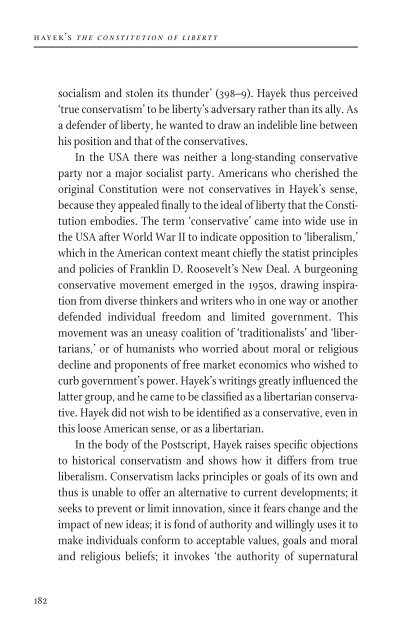Hayek's The Constitution of Liberty - Institute of Economic Affairs
Hayek's The Constitution of Liberty - Institute of Economic Affairs
Hayek's The Constitution of Liberty - Institute of Economic Affairs
Create successful ePaper yourself
Turn your PDF publications into a flip-book with our unique Google optimized e-Paper software.
h ay e k ’ s t h e c o n s t i t u t i o n o f l i b e r t y<br />
w h y i a m n o t a c o n s e r va t i v e<br />
socialism and stolen its thunder’ (398–9). Hayek thus perceived<br />
‘true conservatism’ to be liberty’s adversary rather than its ally. As<br />
a defender <strong>of</strong> liberty, he wanted to draw an indelible line between<br />
his position and that <strong>of</strong> the conservatives.<br />
In the USA there was neither a long-standing conservative<br />
party nor a major socialist party. Americans who cherished the<br />
original <strong>Constitution</strong> were not conservatives in Hayek’s sense,<br />
because they appealed finally to the ideal <strong>of</strong> liberty that the <strong>Constitution</strong><br />
embodies. <strong>The</strong> term ‘conservative’ came into wide use in<br />
the USA after World War II to indicate opposition to ‘liberalism,’<br />
which in the American context meant chiefly the statist principles<br />
and policies <strong>of</strong> Franklin D. Roosevelt’s New Deal. A burgeoning<br />
conservative movement emerged in the 1950s, drawing inspiration<br />
from diverse thinkers and writers who in one way or another<br />
defended individual freedom and limited government. This<br />
movement was an uneasy coalition <strong>of</strong> ‘traditionalists’ and ‘libertarians,’<br />
or <strong>of</strong> humanists who worried about moral or religious<br />
decline and proponents <strong>of</strong> free market economics who wished to<br />
curb government’s power. Hayek’s writings greatly influenced the<br />
latter group, and he came to be classified as a libertarian conservative.<br />
Hayek did not wish to be identified as a conservative, even in<br />
this loose American sense, or as a libertarian.<br />
In the body <strong>of</strong> the Postscript, Hayek raises specific objections<br />
to historical conservatism and shows how it differs from true<br />
liberalism. Conservatism lacks principles or goals <strong>of</strong> its own and<br />
thus is unable to <strong>of</strong>fer an alternative to current developments; it<br />
seeks to prevent or limit innovation, since it fears change and the<br />
impact <strong>of</strong> new ideas; it is fond <strong>of</strong> authority and willingly uses it to<br />
make individuals conform to acceptable values, goals and moral<br />
and religious beliefs; it invokes ‘the authority <strong>of</strong> supernatural<br />
sources <strong>of</strong> knowledge’ when reason fails (406); it assigns special<br />
privileges to persons whom authority recognises as superior and<br />
uses the state to preserve social hierarchy; it distrusts democracy<br />
and blames it for present evils; it lacks sufficient knowledge <strong>of</strong><br />
economics to see that spontaneous forces <strong>of</strong> adjustment can be<br />
counted on to produce beneficial order and growth in the future<br />
as they have in the past; and it is stridently nationalistic, even<br />
to the point <strong>of</strong> endorsing imperialistic missions to civilise other<br />
peoples.<br />
True liberalism, by contrast, is guided by principles and<br />
by a theory <strong>of</strong> social order; it welcomes change and the generation<br />
<strong>of</strong> new ideas; it invests authority in the law and, because<br />
power corrupts, favours the Rule <strong>of</strong> Law over the rule <strong>of</strong> men;<br />
it is tolerant <strong>of</strong> moral and cultural diversity and thus makes it<br />
possible for persons with different values to coexist peacefully;<br />
it acknowledges our inescapable ignorance and avoids explanations<br />
that invoke the supernatural; it denies that anyone can<br />
say, absent competition, who the superior persons are, and also<br />
rejects the notion that such persons should live by different rules,<br />
be guaranteed a special position in society, or be sheltered from<br />
forces <strong>of</strong> economic change; it regards democracy as the least evil<br />
(and therefore the best practicable) form <strong>of</strong> government; it is<br />
willing to let the market work, since it assumes that in economic<br />
matters particularly, ‘the self-regulating forces <strong>of</strong> the market will<br />
somehow bring about the required adjustments to new conditions’<br />
(400); and its outlook is cosmopolitan rather than nationalistic<br />
(399–407).<br />
Hayek identifies himself with what he calls ‘the party <strong>of</strong><br />
liberty’ or ‘the party <strong>of</strong> life.’ <strong>The</strong> party <strong>of</strong> liberty goes back to the<br />
eighteenth century, and it does not coincide with any political<br />
182<br />
183












